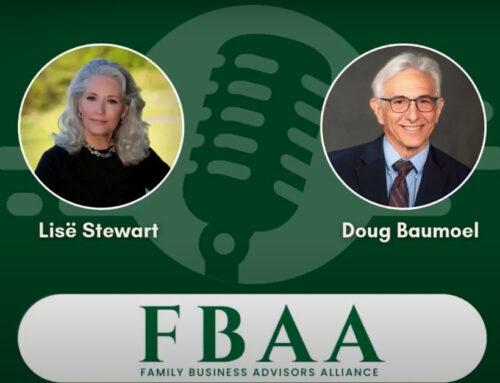When conflict occurs in a family business, it is typically because stakeholders have some combination of the three underlying reasons for conflict: opposing goals, incompatible values, and historical impasse. There are techniques that can be used to help families reinterpret their histories and let go of resentments to help them create the future together that they want.
Last month, we discussed how individuals’ goals and values are determined by their personal quests for security and meaning. Opposing Goals exist when two or more family members have visions or objectives that are mutually exclusive, given current resources. Incompatible Values exist when one or more stakeholders define themselves or what is important to them in ways that are antithetical to other stakeholders.
Often, families will avoid discussing these conflicts because they sense that there are deep commitments on both sides that might make it hard to come to consensus. When this happens, the business can suffer from stakeholders’ inaction. The third underlying reason for conflict, Historical Impasse, can often act as the cement that keeps such situations “stuck”.
“Historical Impasse” refers to the phenomenon whereby a current conflict has roots in historical resentments and grudges still held by family members. We often hear resentful stories of how in “Mom’s generation,” one or several siblings were passed over for ownership or somehow denied their rightful place in the business – and/or control of family wealth. We may never know if, at the time, there were reasonable explanations for the decisions and actions that caused an impasse.
Historical impasses can also be rooted in recent history. Siblings who work together may feel that the other was treated better, provided with more support, and afforded more opportunity growing up. Or, they may feel that their own strategic initiatives were thwarted by another stakeholder or cheated in some fashion. While families cannot (yet) travel back in time and fix the past, it is never too late to try for reconciliation.
Several techniques can help families rewrite, or reinterpret, their histories together:
Re-framing and Creating a Shared Narrative
When families have a negative shared history, but also desire to create a new story together, they can engage in a process of crafting a shared narrative of that history. Much of this is done with the technique of “re-framing.”
In re-framing, a conflict manager will reflect to clients the substance of what they heard, but with neutral language and within the broader context of the discussion. Through this process they help all disputants better understand the underlying interests that drive each of their articulated positions. When disputants hear their narratives in the context of the “big picture” and in less-charged words, they will often open up to considering alternative ways of seeing the situation, let go of their cherished, individual positions and collaborate with each other on a new, shared narrative.
A shared narrative is not intended to cover up the past in order to recast a negative family history as positive. Rather, it is intended to acknowledge what happened in the past, honor the perspectives of all those involved, and articulate the lessons that came from the problematic past in a way that lays the groundwork for a rapprochement.
Releasing of Blame and Forgiveness
It is almost impossible for families to overcome historical impasses without a process of releasing blame and forgiving each other. The key to being able to release blame in a family enterprise is for all parties to acknowledge their own contribution to the impasse and reaffirm the importance of the relationship that was damaged. Impasses are rarely caused exclusively by one party. The act of acknowledging contribution to a problem can be transformative.
Transgressions that lead to historical impasse are typically due to the chaotic process we all go through in trying to achieve our goals and pursue our values. Sometimes these pursuits collide with others’ to deprive them of what they need or want. Individuals rarely go out of their way to deprive others simply because they enjoy doing so. Few people are truly sociopathic. Knowing this, it is often possible to dig into the past to unearth a way forward that works. It’s not easy, but achieving genuine forgiveness through acknowledging the full sweep of history, accepting individual responsibility for contributing to the impasse, and exploring ways to rebuild trust and family bond can open up valuable opportunities for the future of a family and its enterprise. This process often benefits from outside facilitation.
In the words of John F. Kennedy, “Our task is not to fix blame for the past, but to fix the course for the future.” When family members are given the opportunity to look into the past honestly and acknowledge each other’s experiences, they can begin to create new paths for the future.
Our experts are ready to guide your family toward the future you envision. Let’s start the conversation.
Stay in the Know
Get our latest articles, tips, and insights delivered straight to your inbox.
Share this Insight, choose your platform!
About Us
Continuity Family Business Consulting is a leading advisory firm for enterprising families. Using a full suite of service capabilities, we help families prevent and manage the single greatest threat to family and business continuity: conflict. It is through this lens that we advise our clients and build customized strategies for succession planning, corporate governance, family governance, and more. We help families improve decision making, maximize potential and achieve continuity. To inquire, contact us.













